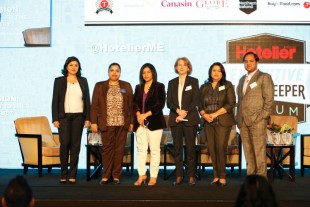

GCC housekeepers divided on labour outsourcing

Outsourcing housekeeping services is inevitable in the Middle East, although both the timing of this eventuality and the ratio of permanent to outsourced staff may differ, according to country, city, brand or individual hotel; this was the conclusion reached by a particularly spirited panel discussion tackling “What’s the Solution to the Casual Staff Issue?” during the 2017 Hotelier Executive Housekeeper Forum held on May 3, at the Grosvenor House in Dubai.
Moderated by Grand Hyatt Doha executive housekeeper Marjona Aslitdinova, members of the panel included Grand Hyatt Dubai housekeeping manager – functional specialist housekeeping Tatjana Ahmed, Movenpick Hotel & Apartments Bur Dubai executive housekeeper Tahera Sultan, Radisson Blu Hotel, Dubai Deira Creek executive housekeeper Sheeja Sasidharan, Crowne Plaza and Holiday Inn Al Thuraya City, Kuwait cluster director of housekeeping Akshi Singh and Fraser Suites Dubai executive housekeeper Minar Aliyar.
Aliyar was the first to bring up the importance of a hotel’s quality relationship and frequent, constant communication with a labour contracting company. The panel then agreed that moving forward as one housekeeping community, negotiations with labour contracting companies should not depend on pricing alone and that certain pre-conditions need to be embedded in agreements.
The conditions discussed by the panel included vital training on a level with the hotel’s standards to be undertaken by contracting companies, with a tracking and monitoring system on hotel premises to be undertaken by contractors. Also cited was the need for contractors to be involved in communicating and planning the casual employees’ shifts and leave schedules in conjunction with the hotel’s operational needs.
Tenure was another issue mentioned by the panel as crucial in order for the hotels to reduce training costs and maintain service standards, with the panel vacillating between a period of one to three years for a casual employee to stay with one hotel before a rotation to another client.
A member of the housekeeping audience then added a recommendation that the hotel’s and the housekeeping department’s KPIs should be taken into consideration when concluding agreements with contracting companies, holding the companies accountable for the department’s KPIs and stipulating financial penalties, should a contractor fail a quality audit or negatively impact a housekeeping department’s guest satisfaction ratings.
Singh highlighted the importance of housekeeping leadership in not making a deliberate divisive distinction between a hotel’s permanent staff and casual staff, that all staff should be treated equally and as one, saying that her hotel, which operates with 40% outsourced housekeeping staff, has also absorbed outsourced staff who have become part of the hotel’s full-time team. Ahmed agreed and narrated a success story example from her hotel of a former casual staff member who later joined the hotel full-time, rose through the ranks and now holds the position of executive housekeeper within the company.
Sasidharan added that government authorities can also play an important role and that ideally, a common platform for ensuring quality standards, such as accreditation or certification, should exist.
Ahmed mentioned that in cases where full outsourcing is an inevitable direction for a hotel, then this should occur gradually so as not to impact service standards and guest satisfaction, citing her hotel as an example where a shift from a casual to permanent ratio of 30/70 to 70/30 happened gradually over a five year period.
A member of the audience also added that housekeepers need to overcome the fear that outsourcing will threaten their jobs, urging everyone instead to look at contracting companies as “service partners”.